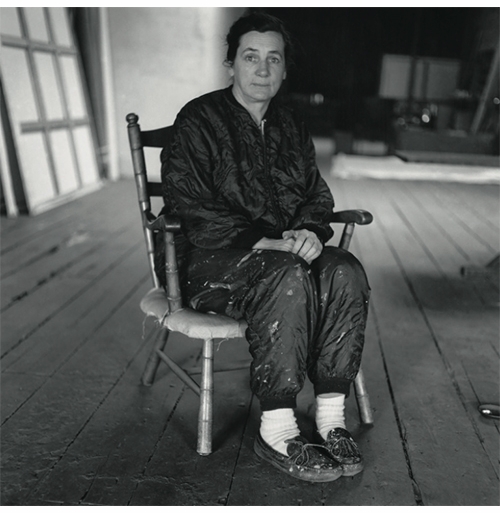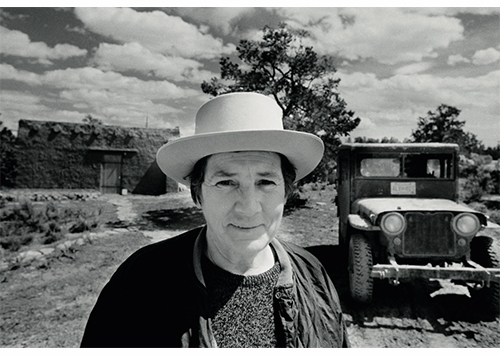| RECENT POSTS DATE 2/1/2026 DATE 2/1/2026 DATE 1/31/2026 DATE 1/29/2026 DATE 1/28/2026 DATE 1/28/2026 DATE 1/25/2026 DATE 1/22/2026 DATE 1/22/2026 DATE 1/21/2026 DATE 1/19/2026 DATE 1/19/2026 DATE 1/18/2026
| | | CORY REYNOLDS | DATE 6/6/2016Below is Agnes Martin's 1989 essay, "Beauty is the Mystery of Life," reproduced from our essential monograph, published to accompany the critically-acclaimed touring retrospective. Reviewing our book for the New York Times Book Review alongside Nancy Princenthal's aptly-timed new biography, Patricia Albers made special note of this particular text, asserting that it is "not to be missed."
ABOVE: Martin in her studio, 1966. Photograph by Diane Arbus.
BEAUTY IS THE MYSTERY OF LIFE
When I think of art I think of beauty. Beauty is the mystery of life. It is not in the eye it is in the mind. In our minds there is awareness of perfection.
We respond to beauty with emotion. Beauty speaks a message to us. We are confused about
this message because of distractions. Sometimes we even think that it is in the mail. The message is about different kinds of happiness and joy. Joy is most successfully represented in Beethoven’s ninth Symphony and by the Parthenon.
All art work is about beauty; all positive work represents it and celebrates it. All negative art protests the lack of beauty in our lives.
When a beautiful rose dies beauty does not die because it is not really in the rose. Beauty is an awareness in the mind. It is a mental and emotional response that we make. We respond to life as though it were perfect. When we go into a forest we do not see the fallen rotting trees. We are inspired by a multitude of uprising trees. We even hear a silence when it is not really silent. When we see a new born baby we say it is beautiful – perfect. The goal of life is happiness and to respond to life as though it were perfect is the way to happiness. It is also the way to positive art work.
It is not in the role of an artist to worry about life – to feel responsible for creating a better world. This is a very serious distraction. All of your conditioning has been directed toward intellectual living. This is useless in art work. All human knowledge is useless in art work. Concepts, relationships, categories, classifications, deductions are distractions of mind that we wish to hold free for inspiration.
There are two parts of the mind. The outer mind that records facts and the inner mind that says “yes” and “no”. When you think of something that you should do the inner mind says “yes” and you feel elated. We call this inspiration.
For an artist this is the only way. There is no help anywhere. He must listen to his own mind.
The way of an artist is an entirely different way. It is a way of surrender. He must surrender to his own mind.
When you look in your mind you find it covered with a lot of rubbishy thoughts. You have to penetrate these and hear what your mind is telling you to do. Such work is original work. All other work made from ideas is not inspired and it is not art work.
Art work is responded to with happy emotions. Work about ideas is responded to with other ideas. There is so much written about art that it is mistaken for an intellectual pursuit.
It is quite commonly thought that the intellect is responsible for everything that is made and done. It is commonly thought that everything that is can be put into words. But there is a wide range of emotional response that we make that cannot be put into words. We are so used to making these emotional responses that we are not consciously aware of them till they are represented in art work.
Our emotional life is really dominant over our intellectual life but we do not realize it.
You must discover the art work that you like and realize the response that you make to it. You must especially know the response that you make to your own work. It is in this way that you discover your direction and the truth about yourself. If you do not discover your response to your own work you miss the reward. You must look at the work and know how it makes you feel.
If you are not an artist you can make discoveries about yourself by knowing your response to work that you like.
Ask yourself: “What kind of happiness do I feel with this music or this picture.”
There is happiness that we feel without any material stimulation. We may wake up in the morning feeling happy for no reason. Abstract or non objective feelings are a very important part of our lives. Personal emotions and sentimentality are anti-art.
We make art work as something that we have to do not knowing how it will work out. When it is finished we have to see if it is effective. Even if we obey inspiration we cannot expect all the work to be successful. An artist is a person who can recognize failure.
ABOVE: Head and shoulders portrait of Martin at her house near Cuba, New Mexico, 1974. Photograph by Gianfranco Gorgoni.
If you were a composer you would not expect everything you played to be a composition. It is the same in the graphic arts. There are many failures.
Art work is the only work in the world that is unmaterialistic. All other work contributes to human welfare and comfort. You can see from this that human welfare and comfort are not the interests of the artist. He is irresponsible because his life goes in a different direction. His mind will be involved with beauty and happiness. It is possible to work
at something other than art and maintain this state of mind and be moving ahead as an artist. The unmaterial interest is essential.
The newest trend and the art scene are unnecessary distractions for a serious artist. He will be much more rewarded responding to art of all times and places. Not as art history but considering each piece and its value to him.
You can’t think “My life is more important than the work” and get the work. You have to think the work is paramount in your life. An artist’s life is adventurous. One new thing after another. I have been talking directly to artists but it applies to all. Take advantage to the awareness of perfection in your mind. See perfection in every thing around
you. See if you can discover your true feelings when listening to music. Make happiness your goal. The way to discover the truth about this life is to discover yourself. Say to yourself: “What do I like and what do I want.” Find out exactly what you want in life. Ask your mind for inspiration about everything.
Beauty illustrates happiness; the wind in the grass, the glistening waves following each other, the flight of birds, all speak of happiness.
The clear blue sky illustrates a different kind of happiness and soft dark night a different kind. There are an infinite number of different kinds of happiness.
The response is the same for the observer as it is for the artist. The response to art is the real art field.
Composition is an absolute mystery. It is dictated by the mind. The artist searches for certain sounds or lines that are acceptable to the mind and finally an arrangement of them that is acceptable. The acceptable compositions arouse certain feelings of appreciation in the observer. Some compositions appeal to some and some to others.
But if they are not accepted by the artist’s
mind they will not appeal to anyone. Composition and acceptance by mind are essential to art work. Commercial art is consciously made to appeal to
the senses which is quite different. Art work is very valuable and it is also very scarce. It takes a great deal of application to make a composition that is totally acceptable. Beethoven’s symphonies with every note composed represent a titanic human effort.
To progress in life you must give up the things that you do not like. Give up doing the things that you do not like to do. You must find the things that you
do like. The things that are acceptable to your mind.
You can see that you will have to have time
to yourself to find out what appeals to your mind. While you go along with others you are not really living your life. To rebel against others is just as futile. You must find your way.
Happiness is being on the beam with life – to feel the pull of life.
- Agnes Martin, 1989
 D.A.P.
Hbk, 8.25 x 10.5 in. / 272 pgs / 160 color. $60.00 free shipping | |
|


